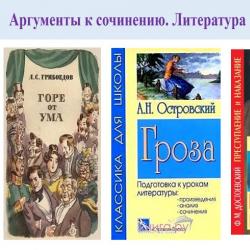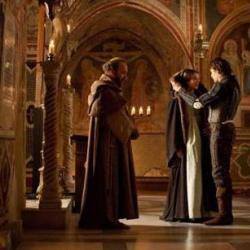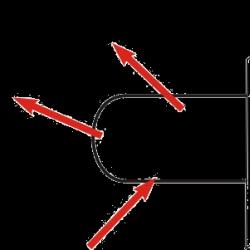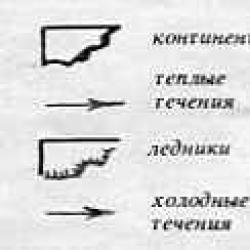Presentation of victory and defeat in literature. Direction “Victory and defeat. Will the vanquished recognize his
Slide 1
Working materials for the final essay in the direction of “Victory and Defeat” Work by teacher of Russian language and literature Ekaterina Kirillovna Repnina (Moscow)
Slide 2

Arguments for the essay. Literature of the 19th century.
Slide 3

Argumentation. Works of world literature
Slide 4

Arguments for the essay. 20th century literature
Slide 5

Final essay. Thematic area “Victory and defeat” In essays in this area, one can discuss victory and defeat in different aspects: socio-historical, moral-philosophical and psychological. Reasoning can be associated both with external conflict events in the life of a person, country, world, and with a person’s internal struggle with himself, its causes and results. Literary works often show the ambiguity and relativity of the concepts of “victory” and “defeat” in different historical and life conditions.
Slide 6

“To live honestly, you have to rush, get confused, fight, make mistakes, but calmness is spiritual meanness” L.N. Tolstoy
Slide 7

Victory and defeat. Aphorisms on the topic
You need to be able to lose. Otherwise it would be impossible to live. e. M. Remarque Success is always someone's defeat. Man was not created for defeat. Man can be destroyed, but cannot be overcome Ernest Hemingway
Slide 8

Sample essay topics
Is it possible to live a happy life without victories? The most important victory is victory over yourself. Victory can be achieved quickly, but the most difficult thing is to secure it. Victory over fear gives a person strength. To win the “war”, sometimes you have to lose the “battle”. Failure helps you understand yourself.
Slide 9

How to write an introduction on a topic? First introduction.
Victory and defeat... In human life they always exist side by side. Each of us strives to achieve a certain success, win and consolidate it. The life path of any person is very difficult. This is usually the path of victories and defeats. A person strives to make fewer mistakes that lead him to complete defeat. In life, we take any defeat hard. This is very difficult because the person is in a difficult situation. But there is another situation when a person wins a victory, which then turns out to be a complete defeat. There is a third situation when a person wins more than one victory and is always able to consolidate this success. Why does this happen in life?
Slide 10

Transition from the introduction to the main part of the essay
These and other questions related to the problem of victory and defeat have always been of interest to world literature. Thus, in Leo Nikolayevich Tolstoy’s novel “War and Peace” we see what a difficult life path his favorite heroes go through - this is the path of quest, the path of victories and defeats. We analyze the pages of the novel from the point of view of what victories Prince Andrei Bolkonsky and Pierre Bezukhov won in life, what failures and defeats they went through.
Slide 11

Second argument to the main part of the essay
And in the story “The Fate of a Man” by Mikhail Aleksandrovich Sholokhov, we meet a simple Russian soldier who was captured by the Germans. Yes, captivity is a terrible defeat. But we are convinced that the author of the story, showing such a difficult life situation, emphasizes that defeat turns out to be a high moral victory for the Russian person. In the interrogation scene, Andrei Sokolov's defeat becomes his moral victory, when the commandant of the prisoner of war camp near Dresden, Müller, admires the dignity, courage and fortitude of the prisoner and highly appreciates him for this - he saves his life, calls him a real Russian soldier.
Slide 12

Conclusion to the essay
So, what conclusion can we draw? Where did my reasoning based on the books of L.N. Tolstoy and M.A. Sholokhov lead me? Re-reading and remembering the pages of these works, I come to the conclusion that in the life of any person the problem of victory and defeat plays a serious role, since it is difficult to go through the path of life without victories and defeats. And how a person endures victory and defeat depends entirely on himself, on his character. This is very important in the life of each of us. So let there be more people in our real life who win than suffer defeat.
Slide 13

Chatsky. Who is he? Winner or loser?
In the comedy “Woe from Wit” by Alexander Sergeevich Griboyedov, we see that few people understand Chatsky in Famusov’s house. The hero with his views turned out to be completely out of place. Moscow society pronounces its verdict on Alexander Chatsky: madness. And when the hero makes his main speech, no one wants to listen to him. What is this? Chatsky's defeat? Writer I.A. Goncharov, in his essay “A Million Torments,” argued that Chatsky is a winner. Why did the author of the essay come to this conclusion? It’s hard to disagree with Goncharov: after all, Chatsky shook up the stagnant Moscow society, destroyed Sophia’s hopes, and shook Molchalin’s position. And this is a real victory!
Slide 14

Scenes from the play "Woe from Wit"
Slide 15

A.S. Pushkin. The tragedy "Mozart and Salieri"
The Italian Salieri perceives the personality of the Austrian composer Mozart as some kind of miracle that refutes his entire life as a person and composer. Salieri is tormented and tormented because he is insanely jealous of the great Mozart. The Italian is a dry person, selfish, rational, terribly envious. He poisoned the Austrian genius. The actual victory goes to Salieri. But what did the Italian composer achieve? After all, he understands and realizes Mozart’s superiority over himself, feels the great power of his talent and the great power of his music. Having killed Mozart, Salieri could not free himself from that terrible envy, which is the source of his real moral torture. He has lost the ability to perceive life easily and joyfully; his soul is burned by envy and pride. And life in such a psychological state is torture, this is real defeat.
Slide 16

"Mozart and Salieri". Scenes from the play
Slide 17

Victory and defeat of Salieri
Slide 18

Raskolnikov's theory and its collapse
Reading F. M. Dostoevsky's novel Crime and Punishment, we learn that the thought of saving the world forced Raskolnikov to create his own theory. He chooses an old money-lender as a victim. The idea haunts the hero. Everything that happens around pushes Raskolnikov to kill the old woman. A noble crime turns into a bloody murder. Murder is a terrible crime, it cannot be calculated. Raskolnikov kills the old pawnbroker and, together with her, takes the life of the kind, humble Lizaveta. Dostoevsky's hero experiences unbearable mental anguish and is terribly tormented. Inhumane thoughts and deeds can never serve the good of humanity. Happiness cannot be built on blood, cruelty and violence. Therefore this theory failed. This is a complete defeat for Raskolnikov. He comes to rethink moral values: “Did I kill the old woman? I killed myself." And, reading the pages of the novel, we clearly realize and understand that only through a humane principle can humanity rise and rise, that there is no other way and cannot be.
Slide 19

Stills from the film “Crime and Punishment”
Slide 20

Defeat and victory of the old fisherman Santiago
The old fisherman Santiago is the hero of the story by the American writer, Nobel Prize winner Ernest Hemingway. Santiago lived a very difficult life, he had no family. The Cuban old man has a faithful boy friend, Manolino. For eighty-four days the old man returned with nothing. And on the eighty-fifth day, all his efforts were rewarded. The fish pulled the old man and the boat forward. It was the first time he had to fight such a huge fish. An exhausted Santiago wins. When the fisherman courageously guarded the fish from sharks that attacked in whole flocks, he lost his harpoon. The old man pulled only a huge skeleton to the shore. “They defeated me, Manolin,” the fisherman said to the boy.
Slide 21

What did Ernest Hemingway show? What does his story “The Old Man and the Sea” make you think about? How did it all end? Victory or defeat? Of course, a victory! It was not just a victory, but a victory of the human spirit, endurance and courage. While on the open sea, Santiago talked to himself and said: “Man was not created to defeat. A person can be destroyed, but cannot be overcome.” How wonderfully said! The story of an American writer about a man who does not give up. The old man's fight with a huge fish, which carried his boat along the Gulf Stream for a long time, had a huge impression on the writer. And he decided to talk about the dignity of man, about the grief and happiness of the winner. The theme of victory and defeat in the story takes on a special role. The old man defeats not only the fish, but his own weakness, fatigue and old age.
Slide 22

Ernest Hemingway's story "The Old Man and the Sea"
Slide 23

Hemingway's story "The Old Man and the Sea"
And the hero asks himself: “Who defeated you, old man?” The fisherman explains the defeat very simply and philosophically: “I just went far out to sea.” Approaching his native village, the old man refuses to consider himself defeated, as his human dignity triumphs. And this is the most important thing for a person. The man is invincible! Santiago comes to a wise philosophical conclusion, so there is incredible lightness in his soul.
Slide 24

Slide 25

Defeat and victory of Andrei Sokolov
The main character of M. A. Sholokhov’s story “The Fate of a Man” is the Russian soldier Andrei Sokolov. . He is the same age as the century, his life has absorbed the history of the country. The Russian soldier was captured by the Germans and is in camp B-14 near Dresden. There are about two hundred thousand prisoners of war here. This is a terrible defeat. Someone reported on Andrei Sokolov, who was outraged by the excessive production rate. The prisoner is summoned for questioning by Müller, the camp commandant. The dialogue with Muller is a psychological duel from which the Russian soldier emerges victorious. At the end of the interrogation, the commandant came out unarmed and said that Sokolov was a brave Russian soldier and Muller would not shoot at him. The commandant rewarded the prisoner: he gave him a loaf of bread and a piece of bacon. Sokolov is the victor, since he managed to survive, preserved the honor of a soldier, showed perseverance, unbending willpower, courage, self-control, bravery, and showed his strong character. He is a real Russian soldier! And we see that “A person’s character does not depend on how he handles victory, but on how he handles defeat.”

Stills from the film “I am a Russian Soldier”
Images from
31.12.2020 “The work on writing essays 9.3 on the collection of tests for the OGE 2020, edited by I.P. Tsybulko, has been completed on the site’s forum.”
10.11.2019 - On the site forum, work on writing essays on the collection of tests for the Unified State Exam 2020, edited by I.P. Tsybulko, has ended.
20.10.2019 - On the site forum, work has begun on writing essays 9.3 on the collection of tests for the OGE 2020, edited by I.P. Tsybulko.
20.10.2019 - On the site forum, work has begun on writing essays on the collection of tests for the Unified State Exam 2020, edited by I.P. Tsybulko.
20.10.2019 - Friends, many materials on our website are borrowed from the books of Samara methodologist Svetlana Yuryevna Ivanova. Starting this year, all her books can be ordered and received by mail. She sends collections to all parts of the country. All you have to do is call 89198030991.
29.09.2019 - Over all the years of operation of our website, the most popular material from the Forum, dedicated to the essays based on the collection of I.P. Tsybulko 2019, has become the most popular. It was watched by more than 183 thousand people. Link >>
22.09.2019 - Friends, please note that the texts of presentations for the 2020 OGE will remain the same
15.09.2019 - A master class on preparing for the Final Essay in the direction of “Pride and Humility” has begun on the forum website.
10.03.2019 - On the site forum, work on writing essays on the collection of tests for the Unified State Exam by I.P. Tsybulko has been completed.
07.01.2019 - Dear visitors! In the VIP section of the site, we have opened a new subsection that will be of interest to those of you who are in a hurry to check (complete, clean up) your essay. We will try to check quickly (within 3-4 hours).
16.09.2017 - A collection of stories by I. Kuramshina “Filial Duty”, which also includes stories presented on the bookshelf of the Unified State Exam Traps website, can be purchased both electronically and in paper form via the link >>
09.05.2017 - Today Russia celebrates the 72nd anniversary of Victory in the Great Patriotic War! Personally, we have one more reason to be proud: it was on Victory Day, 5 years ago, that our website went live! And this is our first anniversary!
16.04.2017 - In the VIP section of the site, an experienced expert will check and correct your work: 1. All types of essays for the Unified State Exam in literature. 2. Essays on the Unified State Exam in Russian. P.S. The most profitable monthly subscription!
16.04.2017 - The work on writing a new block of essays based on the texts of the Obz has FINISHED on the site.
25.02 2017 - Work on writing has begun on the site essays on OB texts Z. Essays on the topic “What is good?” You can already watch.
28.01.2017 - Ready-made condensed statements on the texts of the FIPI OBZ appeared on the website,


Success
Luck
Celebration
Accomplishment
First place
Palm branch
VICTORY
- success in battle, war
complete defeat of the enemy
- success in fighting for something,
accomplishment, achievement of something
as a result of overcoming
DEFEAT
Failure in war, struggle, defeat.
Collapse
Failure
Knockout
Destruction
Losing
Surrender

subject of dispute
Possible logic for revealing the topic
Rival 1
Rival 2
actions
result of action

Logic of topic disclosure
- What is the nature of the struggle: internal or external?
Who is involved in the fight?
- How does the confrontation take place through the eyes of each opponent? On what level: moral? Psychological? What actions is it expressed by?
- Which of the rivals can be called the winner in the struggle for the subject of the dispute?
Is his victory absolute?
What if you look at it through the eyes of a defeated person?
Will the vanquished recognize his
defeat?
Is it absolute?
- What is the subject of dispute or conflict?
What (or what) are we fighting for?
2. What is the nature of the struggle: internal or external? Who is involved in the fight?
3. How does the confrontation take place through the eyes of each opponent? On what level: moral? Psychological? What actions is it expressed by? Are these actions clear?
4. Which of the rivals can be called the winner in the struggle for the subject of the dispute? Is his victory absolute? What if you look at it through the eyes of a defeated person? Does the defeated admit his defeat? Is it absolute?

To be above circumstances means to win
(historical aspect: war
“The Tale of a Real Man” by B. Polevoy)
Victory at any cost
When victory turns into defeat...
"The Veldt" by R. Bradbury)
(moral and philosophical aspect:
"Mad Evdokia"
A. Aleksin)
What doesn't kill me makes me stronger
(psychological aspect:
“Scarecrow” by V. Zheleznikov)

Literary material:
- “War and Peace” by L.N. Tolstoy (did Kutuzov lose by leaving the capital? Did Napoleon win by taking it? Pierre and Helen in the struggle for happiness. Who wins and why?)
- “Fathers and Sons” by I.S. Turgenev (having been defeated in love, in what way did Bazarov win?)
- “Heart of a Dog” M.A. Bulgakov
(Can a person defeat the power of nature? And how does he win by admitting his own powerlessness?)

Literary material: who wins and loses in what ways?
- “Paradox” by V.G. Korolenko (Physically limited, the “phenomenon” shows the unlimited possibilities of the human spirit and instills optimism and faith in the boys)
- “Telegram” by K. G. Paustovsky (Having organized and successfully held an exhibition of the artist’s works, the main character still loses. In what?)
- “Matryona’s yard” by A.I. Solzhenitsyn (In the eyes of her fellow villagers, Matryona loses as a housewife, but morally she stands much higher than them)

Literary material: who wins and loses in what ways?
- “There May Be Tigers Here” by R. Bradbury
(By leaving an amazing and generous planet, astronauts lose the chance to find happiness)
- “The Book Thief” by M. Zusak (The power of words turns out to be stronger than death itself, it is the love of the book that saves the main character in life’s circumstances and teaches her to win)
- “Roadside Picnic” by A. and B. Strugatsky
(In search of the golden ball, the stalker sacrifices the life of a very kind young man. Does he win in this case?)

Possible topics
- Is it possible to live a happy life without victories?
- To win the “war”, sometimes you need to lose the “battle”. (N. Bonaparte)
- Victory over fear gives us strength. (V. Hugo)
- Victory can be achieved quickly, but it is difficult to secure it. (Ranke)
- The most important victory is victory over yourself
- Discipline is the mother of victory. (A.V. Suvorov)
- If you want to conquer the whole world, defeat yourself (F.M. Dostoevsky)
- Winning is the stupidest thing. Not to win, but to convince - that is what is worthy of glory. (V. Hugo)
- Victory is always desired.
- Victory and defeat are relative concepts...

Internet resources
Website: fipi.ru
essay11.rf
Official comment
Direction allows you to reflect on victory and
defeat in different aspects: socio-historical, moral-philosophical,
psychological. The reasoning may be related
as with external conflicting events in life
person, country, world, and with internal struggle
a person with himself, its reasons and
results.
Literary works often show
ambiguity and relativity of concepts
"victory" and "defeat" in different historical
conditions and life situations.
Contrasting the concepts of “victory” and “defeat”
is already inherent in their interpretation. Ozhegov reads: “Victory -
success in battle, war, complete defeat of the enemy.” That is
the victory of one implies the complete defeat of the other.
However, both history and literature give us examples of how
victory turns out to be defeat, and defeat turns out to be victory.
It is about the relativity of these concepts that we propose
graduates can speculate based on their reading
experience.
Of course, limit ourselves to the concept of victory as defeat
enemy in battle is impossible. Therefore it is advisable
consider this thematic area in different
aspects. Aphorisms and sayings
famous people
The greatest victory is victory over yourself.
Cicero
The possibility that we may fail in
battle should not prevent us from fighting for a cause that
we think it's fair.
A.Lincoln
Man was not created to suffer defeat...
Man can be destroyed, but he cannot be defeated.
E. Hemingway
Be proud only of the victories you have won over
yourself.
Tungsten literature Socio-historical aspect
Here we will talk about the external conflict of social groups, states,
military operations and political struggle.
Peru A. de Saint-Exupery belongs to the paradoxical, on the first
view, statement: “Victory weakens the people - defeat awakens
He has new strength..." We find confirmation of the correctness of this idea in
Russian literature.
“The Tale of Igor’s Campaign” is a famous monument of literature of Ancient Rus'.
The plot is based on the unsuccessful campaign of the Russian princes against the Polovtsians,
organized by Novgorod-Seversk Prince Igor Svyatoslavich in
1185 The main idea is the idea of the unity of the Russian land. Princely
civil strife weakening the Russian land and leading to its ruin
enemies, make the author bitterly sad and lament; Victory over
enemies fills his soul with ardent delight. However, about defeat, not
the victory is told in this work of ancient Russian literature,
after all, it is defeat that contributes to the rethinking of the past
behavior, gaining a new view of the world and oneself. That is defeat
stimulates Russian soldiers to victories and exploits. The author of the Lay addresses all Russian princes
one by one, as if calling them to account and
demandingly reminding them of their duty to
homeland. He calls them to protect the Russian land,
“block the gates of the field” with your sharp arrows. AND
therefore, although the author writes about defeat, there is no
and shadows of despondency. The “Word” is just as laconic and
laconic, like Igor’s addresses to his squad.
This is the call before battle. The whole poem seems to be addressed to
future, permeated with concern for this future. Poem
about victory would be a poem of triumph and joy. Victory -
this is the end of the battle, defeat for the author of the Lay
This is just the beginning of the battle. Battle with the steppe enemy
It's not over yet. Defeat must unite
Russians. The Civil War turned out to be so significant
event in the history of Russia that she could not help but find
reflections in fiction. Basis for
graduates' reasoning may be "Don
stories", "Quiet Don" by M.A. Sholokhov.
When one country goes to war with another,
terrible events: hatred and the desire to defend oneself
forces people to kill their own kind, women and
old people are left alone, children grow up orphans,
cultural and material values are destroyed,
cities are being destroyed. But the warring parties have a goal -
defeat the enemy at any cost. And any war has
the result is victory or defeat. Victory is sweet and immediate
justifies all losses, defeat is tragic and
sad, but it is the starting point for some
another life. But "in a civil war, every victory
there is defeat" (Lucian). The history of mankind consists of victories and defeats in
wars. In the novel “War and Peace” L.N. Tolstoy describes
participation of Russia and Austria in the war against Napoleon.
L. Tolstoy shows a significant difference between
two campaigns: 1805-1807 and 1812. On
The fate of Russia was decided on the Borodino field. Here
desire to save oneself, indifference to what is happening
there were no Russian people. Here, as stated in
Lermontov, “and we promised to die, and the oath of allegiance
We held back in the Battle of Borodino.”
The opportunity to speculate on how victory in one
the battle can turn into a defeat in the war, gives
the outcome of the Battle of Borodino, in which the Russians
troops win a moral victory over
French. Moral defeat of Napoleon's troops
near Moscow - the beginning of the defeat of his army. The life story of the central character of the epic novel
M. Sholokhov “Quiet Don” by Grigory Melekhov,
reflecting the dramatic destinies of the Don Cossacks,
confirms this idea. War cripples from within and
destroys all the most precious things that people have.
She makes the characters look at things in a new way.
problems of duty and justice, seek the truth and
not to find it in any of the warring camps.
Once with the Reds, Grigory sees the same
that whites have cruelty, intransigence, thirst
blood of enemies. Melekhov rushes between two
warring parties. Everywhere he comes across
violence and cruelty that cannot be accepted,
That's why he can't take one side.
The result is logical: “Like a steppe scorched by fires,
Gregory’s life became black...” Moral-philosophical and
psychological aspects
Victory is not only about success in battle. Win a victory,
according to the dictionary of synonyms, - overcome, master, overcome.
And often not so much the enemy as yourself.
Let us consider a number of works from this point of view.
A.S. Griboyedov "Woe from Wit". The conflict the play presents
represents the unity of two principles: public and personal. Being
an honest, noble, progressive-minded person,
freedom-loving, the main character Chatsky opposes
Famusov society. He condemns inhumanity
serfdom, remembering “Nestor of noble scoundrels”,
who exchanged his faithful servants for three greyhounds; to him
I am disgusted by the lack of freedom of thought in noble society:
“And who in Moscow hasn’t had their mouths shut at lunches, dinners and
dancing?". He does not recognize veneration and sycophancy Society is offended and, in defense, declares Chatsky
crazy.
Psychological conflict turns into conflict
public.
I.A. Goncharov assessed the ending of the play this way: “Chatsky
broken by the amount of old power, inflicting it on his
turn a fatal blow with the quality of the new force.”
Chatsky does not give up his ideals, he only
freed from illusions.
Therefore, Chatsky’s defeat is only temporary
defeat and only his personal drama. IN
on a public scale “victory of the Chatskys
inevitable." The “century of the past” will be replaced by the “century
current", and the views of the hero of the comedy Griboyedov
will win. A.N. Ostrovsky "Thunderstorm". Graduates may wish to reflect on the question of
about what Katerina’s death is – victory or defeat. On that
The question is difficult to give a definite answer. Too many reasons have led to
terrible ending. The playwright sees the tragedy of Katerina’s situation in the fact that
she comes into conflict not only with the Kalinov family morals, but also
with myself. The straightforwardness of Ostrovsky's heroine is one of the sources of her
tragedy.
Throughout the play there is a painful struggle in Katerina’s consciousness between
understanding of his wrongness, his sinfulness and vague, but increasingly
an imperious sense of his right to human life. But the play
ends with Katerina’s moral victory over the dark forces,
tormenting her. She atones for her guilt immensely, and from captivity and humiliation
leaves the only way that was open to her. Her decision to die, only
not to remain a slave, expresses, according to Dobrolyubov, “the need
the emerging movement of Russian life." And this decision comes to Katerina
along with internal self-justification. She dies because she believes
death is the only worthy outcome, the only possibility
preserve the highest that lived in her. In the thought that Katerina's death is actually
in fact is a moral victory, a triumph of the real Russian soul over
forces of the “dark kingdom” of the Wild and Kabanovs, is also strengthened by the reaction to its
death of other characters in the play. I.S. Turgenev "Fathers and Sons". The writer shows the struggle in his novel
worldviews of two political directions. The plot of the novel is constructed
on the contrast of the views of Pavel Petrovich Kirsanov and Evgeniy
Bazarov, who are bright representatives of two generations,
not finding mutual understanding.
Turgenev, as it were, takes his heroes through different
tests. And the strongest of them is the test of love. After all
It is in love that a person’s soul reveals itself fully and sincerely.
And then Bazarov’s hot and passionate nature swept away all of him
theories.
It seems that Bazarov is defeated in the test of love.
Firstly, his feelings and he himself are rejected. Secondly, he
falls into the power of aspects of life that he himself denies, loses
the ground under his feet, begins to doubt his views on
life. His life position turns out to be a pose in which,
True, he sincerely believed. Bazarov begins to lose meaning
life, and soon loses life itself. But this is also a victory: love
forced Bazarov to look at himself and the world differently, he
begins to understand that life does not want to fit into anything
into a nihilistic scheme. F.M. Dostoevsky "Crime and Punishment".
"Crime and Punishment" is an ideological novel,
in which non-human theory collides with
human feelings.
The writer finds a surprisingly accurate expression,
characterizing Raskolnikov’s internal state:
it was as if he had cut himself off from everyone with scissors and
everything." The hero becomes disappointed in himself, believing
that he did not pass the test of being a ruler, but
This means, alas, that it belongs to “trembling creatures.”
Surprisingly, Raskolnikov himself would not want
be a winner now. After all, winning means
morally die, remain with your spiritual
chaos forever, to lose faith in people, yourself and life.
Raskolnikov's defeat became his victory - victory
over himself, over his theory, over the Devil, who
took possession of his soul, but failed to oust him forever
her God. M.A. Bulgakov "The Master and Margarita".
The novel “The Master and Margarita” is about responsibility
man for the good and evil that is committed on
earth, for your own choice of life paths,
leading to truth and freedom or to slavery,
betrayal and inhumanity. It
all-conquering love and creativity, uplifting
soul to the heights of true humanity.
The author wanted to proclaim: the victory of evil over
good cannot be the end result
social and moral confrontation. This
according to Bulgakov, nature itself does not accept
human, should not allow the whole move
civilization. Of course, the range of works in which
the thematic direction “Victory” is revealed
and defeat” is much broader. Main -
see the principle, understand that victory and defeat are
concepts are relative.
R. Bach wrote about this in his book “Bridge over
eternity": "What matters is not whether we lose the game,
what matters is how we lose and how thanks to this
let's change, what's new for ourselves, how
We can apply this to other games. strange
the way defeat turns out to be victory.” sources
http://www.wpclipart.com/blanks/book_blank/diary_open_blank.png notebook
http://7oom.ru/powerpoint/fon-dlya-prezentacii-bloknot-07.jpg sheets
https://www.google.ru/search?q=%D0%B5%D0%B3%D1%8D&newwindow=1&source=lnms&tbm=i
sch&sa=X&ved=0ahUKEwjO5t7kkKDPAhXKEywKHc7sB-IQ_AUICSgC&biw=1352&bih=601#newwind
ow=1&tbm=isch&q=%D0%B5%D0%B3%D1%8D+%D0%BB%D0%BE%D0%B3%D0%BE%D1%82%D0%B8%D0%BF&i
mgrc=QhIRugc5LIJ5EM%3A
http://www.uon.astrakhan.ru/images/Gif/7b0d3ec2cece.gif compass
http://4.bp.blogspot.com/-DVEvdRWM3Ug/Vi-NnLSuuXI/AAAAAAAAAGPA/28bVRUfkvKg/s1600/essay-clipa
rt-24-08-07_04a.jpg
student
http://effects1.ru/png/kartinka/4/kniga/1/kniga_18-320.png books
Methodological recommendations for preparing for writing the final essay in 2016/2017
academic year for teachers of Russian language and literature - Stavropol, 2016. - 46 p.
The author of the presentation is a teacher of Russian language and literature, MBOU Secondary School No. 8, Mozdok, RSO-Alania, Pogrebnyak N.M.






